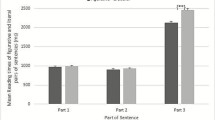Abstract
Sentences containing idioms used either literally or figuratively were presented repeatedly for 100 msec per presentation. Half of the sentences were preceded by a paragraph. The number of presentations required to read the sentences and cued recall of the sentences were recorded. The serial brief presentations method provided predictable and meaningful results. Sentences containing idioms used literally required more presentations than those containing idioms used figuratively. Cued recall was better for idioms used literally than for those used figuratively. These results are interpreted as support for the Idiomatic Processing Model of idiom comprehension, which suggests that the figurative meaning is processed first; only if that one is inappropriate is the literal meaning processed.
Similar content being viewed by others
References
Bobrow, S., & Bell, S. (1973). On catching on to idiomatic expressions.Memory and Cognition, 1, 343–346.
Clark, H.H., & Clark, E.V. (1977).Psychology and language. New York: Harcourt Brace Jovanovich.
Estill, R.B., & Kemper, S. (1982). Interpreting idioms.Journal of Psycholinguistic Research, 11, 559–568.
Gibbs, R.W. (1980). Spilling the beans on understanding and memory for idioms in conversation.Memory and Cognition, 8, 149–156.
Glass, A.L. (1983). The comprehension of idioms.Journal of Psycholinguistic Research, 12, 429–442.
Kempler, d., Van Lancker, D., & Read, S. (1986).Proverb and idiom comprehension in Alzheimer's disease. Unpublished manuscript.
Ortony, A., Schallert, D.L., Reynolds, R.E., & Antos, S.J. (1978). Interpreting metaphors and idioms: Some effects of context on comprehension.Journal of Verbal Learning and Verbal Behavior, 17, 465–477.
Reicher, G.M. (1969). Perceptual recognition as a function of meaningfulness of stimulus materials.Journal of Experimental Psychology, 81, 275–280.
Schweigert, W.A. (1986a). Idiom comprehension and its relation to lexical ambiguity (Doctoral dissertation, Ohio University, 1985).Dissertation Abstracts International, 47, 1308B.
Schweigert, W.A. (1986b). The comprehension of familiar and less familiar idioms.Journal of Psycholinguistic Research, 15, 33–45.
Swinney, D.A., & Cutler, A. (1979). The access and processing of idiomatic expressions.Journal of Verbal Learning and Verbal Behavior, 18, 523–534.
Van Lancker, D.R., & Kempler, D. (1987). Comprehension of familiar phrases by left-but not by right-hemisphere damaged patients.Brain and Language 32, 265–277.
Author information
Authors and Affiliations
Rights and permissions
About this article
Cite this article
Schweigert, W.A., Moates, D.R. Familiar idiom comprehension. J Psycholinguist Res 17, 281–296 (1988). https://doi.org/10.1007/BF01067198
Accepted:
Issue Date:
DOI: https://doi.org/10.1007/BF01067198




